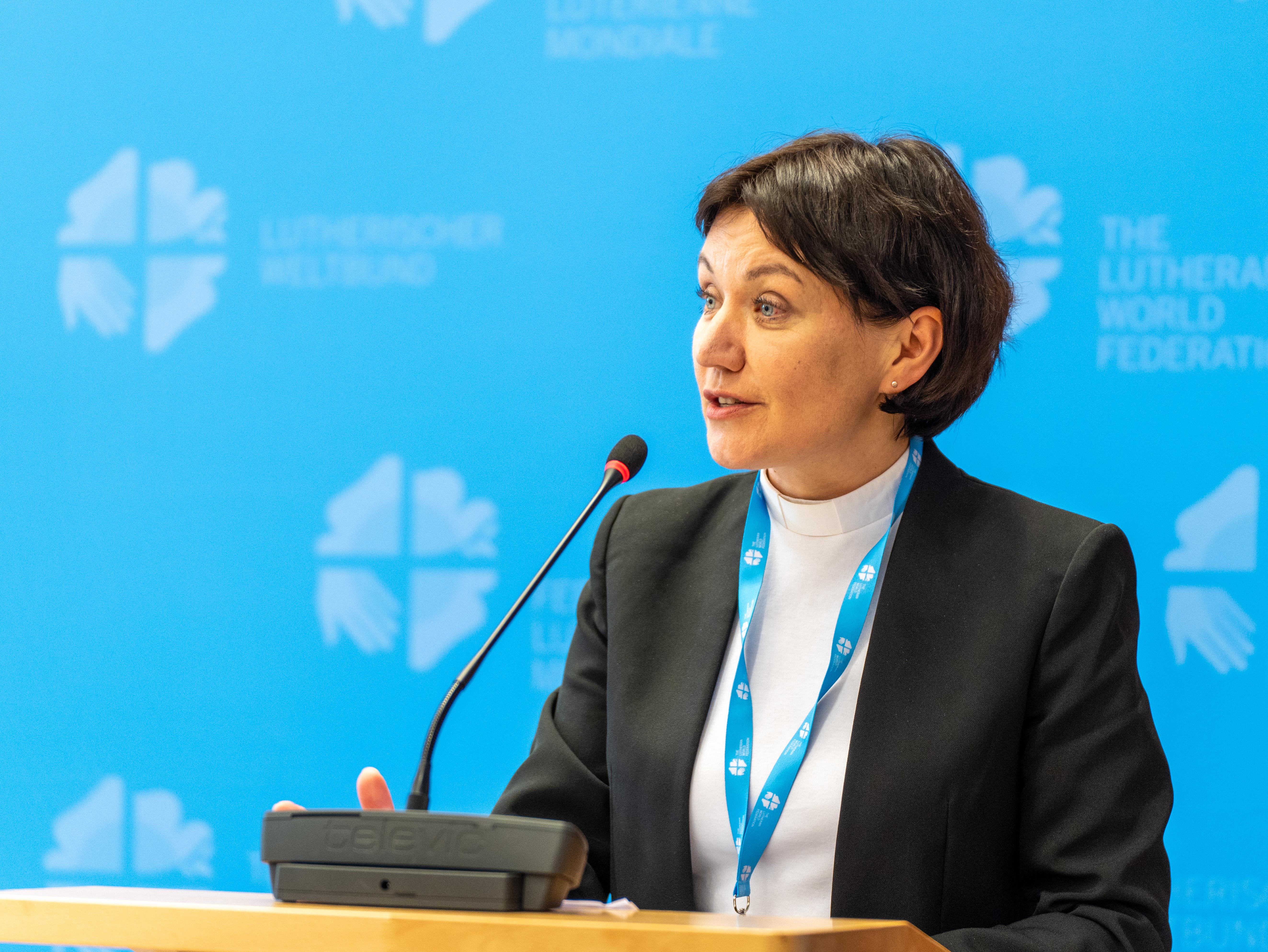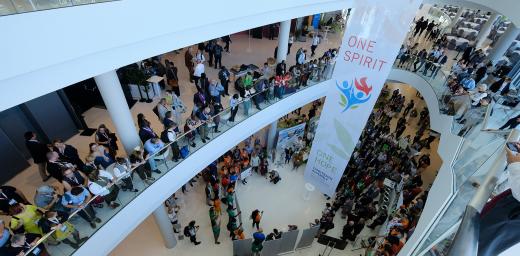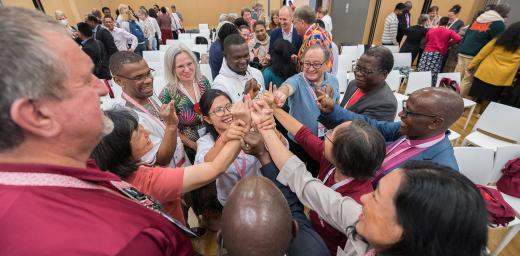General Secretary reflects on past year of activities as global communion prepares for Krakow Assembly
(LWI) - A year of consolidating in-person relationships, strengthening ecumenical partnerships, stepping up the work to serve the most vulnerable communities and looking ahead to the Thirteenth Assembly in Krakow
In her report to the Lutheran World Federation (LWF) Council, meeting for the last full business session of its mandate, General Secretary Rev. Dr Anne Burghardt highlighted priorities and achievements of the past year, as the global communion of churches prepares to gather in Poland for the Thirteenth Assembly.
Thanking the outgoing Council members for their “faithful service,” especially during the switch to online activities during the pandemic, she urged them to “to continue to be part of the multi-faceted witness and service of the LWF” and to “remain ambassadors of the communion and its work” in their local contexts.
Nurturing regional relationships
As a global communion, she affirmed, “the nurturing of regional and cross-regional relationships between member churches is a core task of the LWF.” Recent regional leadership consultations and the Pre-Assemblies in Europe, Africa, Latin America and Asia have been important ways of consolidating those regional relationships, as well as highlighting key concerns to take to the Assembly in the autumn.
A further development aimed at strengthening communion relations is the proposal for a Mutual Accountability Framework, to which member churches will be invited to commit to “deepen their understanding of unity,” Burghardt said. A consultant has been hired by the LWF to work with church leaders, while also exploring any existing examples within other Christian world communions.
Strengthening ecumenical partnerships
The General Secretary gave an overview of significant ecumenical events that have taken place over the past year at both bilateral and multilateral level. These include a first in-person meeting of the Anglican-Lutheran International Commission on Unity and Mission and the completion of statement from the International Lutheran-Pentecostal Dialogue. Entitled ‘The Spirit of the Lord is Upon Me’, this statement was put to the Council for reception.
During the past year, the Joint Lutheran-Orthodox Theological Commission also met in Wittenberg and celebrated 40 years of dialogue at global level. Meanwhile the LWF continues to work with the Dicastery for the Promotion of Christian Unity to prepare for a sixth phase of Lutheran-Catholic dialogue, while cooperation has been stepped up with the World Communion of Reformed Churches to prepare for a conference in December on ‘Religious Freedom and Belief’.
At multilateral level, collaboration with the World Counci of Churches (WCC) included participation in the WCC Assembly in Karlsruhe last September, where Lutherans were the largest confessional group, Burghardt noted. Cooperation with the Global Christian Forum also continues, with the Assistant General Secretary serving on the planning committee for the next global meeting to be held in Ghana in 2024. The LWF was also represented at the Conference of the General Secretaries of Christian World Communions which met in Vancouver, Canada, in November.
Education, peacebuilding and diaconal work
In her report, the General Secretary also spoke about the LWF’s vital work in the field of theological education and leadership development, especially the empowerment of women and young people through scholarships and other capacity building initiatives. An online BA-curriculum on global Lutheran theology is being planned, to be hosted under the auspices of one of the member church-related faculties.
Peacebuilding and interfaith relations have also been an important part of LWF’s work over the past year, with a major international conference hosted in Geneva in partnership with Islamic Relief Worldwide and HIAS, the Hebrew Immigrant Aid Society. The Peace Messengers Training for young people was also revived in 2022 with training held in Geneva and Rwanda for youth from all LWF regions.
Diaconal work continues to be a key part of the mission of churches around the world, with the LWF playing a supporting role. At the end of 2022, a Communion Solidarity Fund was launched with the goal of offering a quick response to those suffering from the effects of conflicts, natural disasters, public health concerns or similar. Burghardt said: “We are very grateful for the good response and support we have received so far from our member churches to the Communion Solidarity Fund.”
Advocacy and humanitarian response
Reflecting on the LWF’s advocacy work, the General Secretary spoke about continued engagement with the United Nations through mechanisms including the Human Rights Council, the Universal Periodic Review, the Commission on the Status of Women and the Convention on the Elimination of all forms of Discrimination against Women.
Working for Gender Justice and Climate Justice remained important goals, including strong participation in the COP27 meeting in Egypt last year.
Burghardt spoke of highlights from LWF’s humanitarian and development in 2022, including the ongoing response to the Ukraine crisis, emergency shelter and protection for people fleeing the conflict in Ethiopia's Tigray region and a first cross-border response to the South Sudanese crisis. In South Sudan, LWF signed a Memorandum of Understanding with the Catholic Diocese of Torit to provide skills training and integrated humanitarian, development and peace programs.
LWF staff in Chad, South Sudan and Ethiopia have also been monitoring and responding to the recent outbreak of conflict in Sudan, providing emergency food, shelter and clean water for refugees. In Haiti, due to worsening violence, the shared LWF office is being relocated outside of the capital Port-au-Prince. In Jerusalem, a new CEO was appointed for the Augusta Victoria Hospital in 2022 and in July the program hosted a visit by U.S. President Biden during his trip to Israel and Palestine. In 2023, Burghardt also led an advocacy mission to New York and Washington D.C. to meet with high-level United Nations officials, as well as secure continued support for the Jerusalem hospital amid very challenging circumstances.
The General Secretary concluded her review by speaking of the work for financial stability in a context of “high inflation, the war in Europe and decreased income for many of the LWF’s major supporters.” Important steps include the setting up of the new Swiss-based ‘Olive Branch Foundation’ and preparations by LWF World Service for the use of a new mechanism known as ‘development impact bond’ in one of the country programs. Enhancing the visibility of the LWF and grass-rooting it within local dioceses and congregations will be vital in ensuring its sustainability, she said.
The LWF Council is the highest authority of the LWF between Assemblies. It consists of the President, the Chairperson of the Finance Committee, and 48 members from LWF member churches in seven regions. The current governing body was elected at the May 2017 Twelfth Assembly in Windhoek, Namibia.






